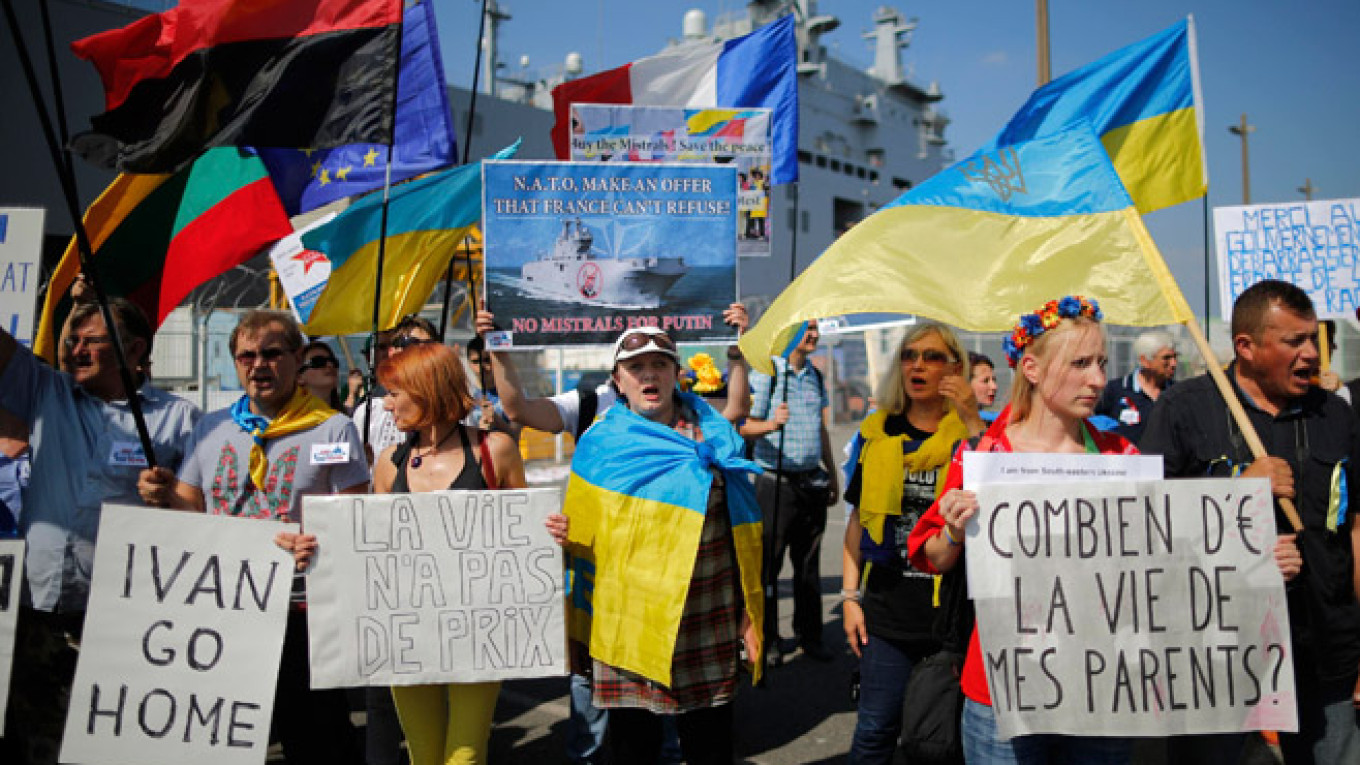Speaking at the Seliger 2014 National Youth Forum in late August, President Vladimir Putin said that there are people in this country who are working against Russia's national interests. But what exactly are Russia's national interests?
Does only one correct interpretation of those interests exist? Do Putin's remarks suggest that he, alone, by virtue of his office, knows the true nature of Russia's national interests?
More importantly, does the Kremlin's current policy toward Ukraine meet Russia's national interests? I have serious doubts about every one of these questions.
March saw the "reunion" of Crimea with Russia — or what Ukraine and the West refer to as its "annexation." Russia retook a major chunk of Ukraine, despite the fact that it had always recognized Crimea as part of Ukraine in all bilateral and multilateral treaties and agreements — all of which, by the way, are still in force.
Now Moscow stands accused of providing large-scale support for pro-Russian separatist forces in the self-declared people's republics of Donetsk and Luhansk in eastern Ukraine. That support allegedly includes arms, ammunition, volunteers, mercenaries, advisors and even regular troops.
As a result, the decision by authorities in Kiev to suppress the armed rebellion in the east — that they refer to as an anti-terrorist operation — has, for several months now, turned into a bloody war of widespread destruction that has claimed the lives of thousands of soldiers and civilians on both sides.
This is a war that shows no sign of ending and in which the West views Russia as one of the combatants.
The seizure of foreign territory with the use of armed force — and even awarding medals and honors to the participants, shelling a foreign territory, sending troops, weapons and "armed gangs, groups, irregular forces and mercenaries" into a foreign territory — all of these are clear examples of aggression as spelled out by Resolution 3314 of the UN General Assembly and adopted in December 1974.
These are the crimes that Russia has been increasingly accused of committing in recent months.
According to the Russian Constitution, the Federation Council must authorize the use of Russia's armed forces abroad. However, it has not done so with regard to eastern Ukraine. If Russia's army really is involved there, it raises the question of accountability for the individuals who made that decision.
Not only is the Ukrainian crisis the largest in post-Soviet history to unfold on the territory of the former Soviet Union, but it has also dramatically changed the entire situation concerning Russia.
The West has imposed economic sanctions against Russia and personal sanctions against senior Russian officials. According to estimates, those sanctions will cause hundreds of billions of dollars in damage to the already fragile Russian economy.
The Economic Development Ministry has downgraded its prediction of economic growth in the coming years and anticipates lower investment and increased inflation and capital flight, among other problems.
Technology-related sanctions have also been introduced and expanded, restricting Russia's access to high technology in the fields of energy, electronics, telecommunications and defense manufacturing. This, in turn, creates challenges to achieving the innovative modernization of the Russian economy.
The European Union, Russia's main trade and economic partner, has intensified efforts to reduce its dependence on Russian energy supplies. That would reduce the influx of money from European consumers — still Russia's main source of foreign currency and budget revenues.
EU-Russian relations are now at their lowest point in the entire post-Soviet period. The two sides have practically halted the preparation of any new basic agreements and relations with Germany, Russia's main European partner, are ruined.
Moscow's actions have served to consolidate Ukrainian society against Russia. Public support for closer relations with the EU and movement toward NATO has reached record highs.
The neutral states of Sweden and Finland are preparing to sign an agreement on military cooperation with NATO and the alliance is looking at options for expanding its military presence to Eastern Europe and the Baltic states.
Having managed to bring Western sanctions on itself, Russia is now shifting its focus to China in hopes of finding new markets and substitutes for Western technology. However, that raises the risk of selling resources to China at unfavorable, below market prices — just as Iran was forced to do in response to sanctions.
What's more, China and other non-Western states simply do not have the same technologies the West previously supplied to Russia. In the end, Russia is likely to find itself geopolitically more dependent on its large and powerful eastern neighbor.
Russia's actions also threaten Eurasian integration and the CIS itself. Will Ukraine leave the CIS now, as Georgia did following the Russia-Georgia War in 2008? When creating the Eurasian Economic Union linking Russia with Kazakhstan and Belarus, officials thoroughly vetted all the documents of any hint at political integration between the countries.
Now, those countries cannot but fear the prospect of Moscow's continued expansion under the slogan of reintegrating the "Russian world." Recent sharply worded comments by Kazakh President Nursultan Nazarbayev indicate just how concerned Customs Union members are over Russian expansionism.
All of this fundamentally differs from the objectives described in the Russian Foreign Policy Concept that President Putin approved on Feb. 18, 2013.
That document sets out Russia's principal foreign policy objectives, including the following: "promoting good-neighborly relations with adjoining states and helping to overcome existing and prevent potential tensions and conflicts in regions adjacent to the Russian Federation."
The document also declares Russia's commitment to developing bilateral and multilateral relations with other states based, among other things, on respect for their sovereignty and territorial integrity as well as the predictability and non-confrontational nature of Russian policies.
That is precisely how the Kremlin's document properly defines Russia's national interests. However, actual events are moving in the exact opposite direction.
Vladimir Ryzhkov, a State Duma deputy from 1993 to 2007, is a political analyst.


